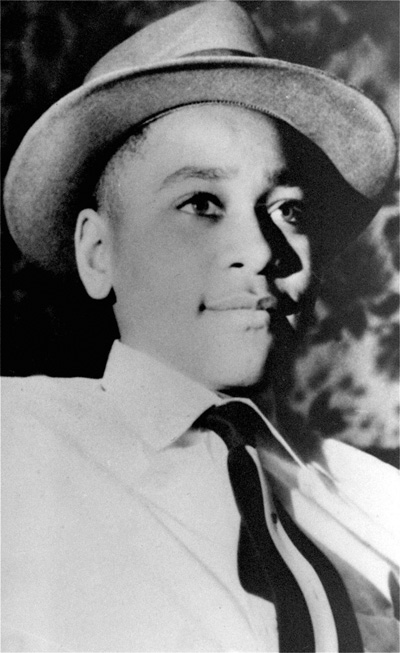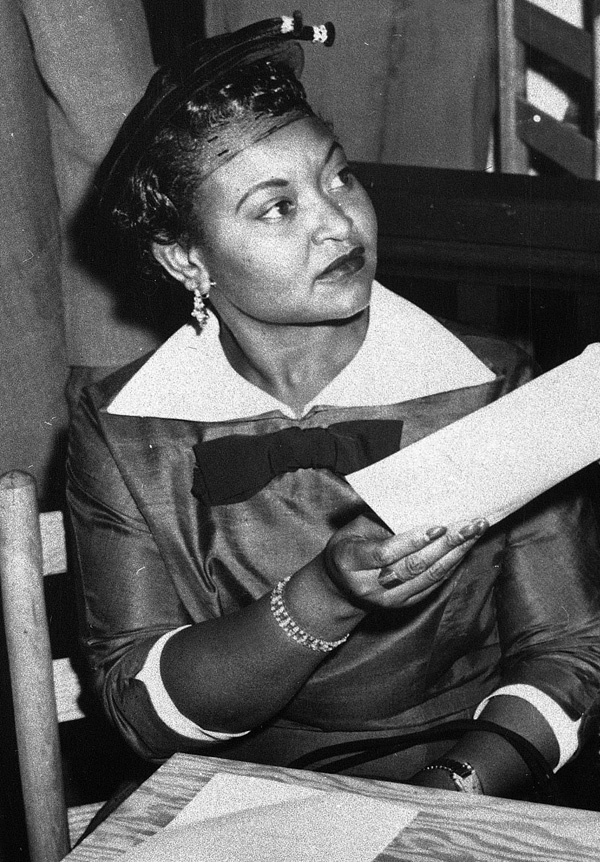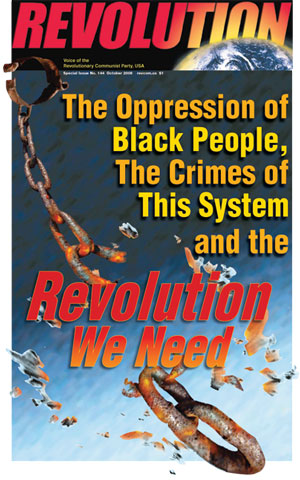Chicago: 60 Years After the Racist Murder of Emmett Till—Honoring the Fighters for Justice Then and Now
September 7, 2015 | Revolution Newspaper | revcom.us
Emmett Till, 1941-1955

From readers:
On Sunday, August 30, hundreds gathered at the Roberts Temple Church of God in Christ on Chicago's South Side, the same church where 60 years ago tens of thousands of people lined up to see 14-year-old Emmett Till's murdered and mutilated body lying in an open casket. It was in August 1955 that white men came to the house in Money, Mississippi, where Emmett Till was staying with relatives for the summer and dragged him off because they said he whistled at a white woman. They took him to the river, beat him mercilessly, shot him, tied him to a heavy metal fan, and threw him into the water. The lynchers were never punished, even though they admitted to the murder in a national magazine.
Called a "Gospel Regeneration Revival and Recognition Ceremony," the August 30 event honored Mamie Till, the heroic mother of Emmett Till who fought for justice for her son and for his story to be told to the whole world; family members and others who stood up at the time of Emmett's murder; and families of Black people fighting for justice for their loved ones, many of them children, murdered by police and racists in today's New Jim Crow. The ceremony was part of a weekend of events organized by the Mamie Till Mobley Memorial Foundation, including a trip to the cemetery where Emmett and his mother were buried, and a Youth Empowerment day at the University of Chicago.
When you walked in, the first thing you saw were pictures of Emmett Till, with his beautiful eyes as he looked before he was murdered, and his unrecognizable, mutilated body in the casket. One child attending the commemoration looked from one picture to the other, and then said of the picture of Emmett’s mutilated body, "That can't be a human being.”
There were people at the ceremony who had been at Emmett Till's funeral 60 years ago. One woman, an usher and relative of Emmett, said, "He was lying right there, just like in the picture." She remembered the church being packed, with people "of all races and creeds, all colors" and "police all around, up to 47th Street" (seven blocks away).
See also: Interview with Educator and Oral Historian Timuel Black: Remembering the Lynching and Funeral of Emmett Till: "I was ANGRY!"
Another woman who had been at Emmett's funeral had come to the ceremony from Los Angeles. She was 10 at the time of Emmett’s murder and visiting her grandparents in Alabama. She said her parents made her come home right away: "It was so dangerous for Black people at that time." She remembered the funeral and how scary it was for a 10-year-old "that an adult could do that to a child."
Bob Avakian on "Emmett Till and Jim Crow: Black people lived under a death sentence"
Transcript of this clip available here.
Who is Bob Avakian?
Because of Bob Avakian and the work he has done over several decades, summing up the positive and negative experience of the communist revolution so far, and drawing from a broad range of human experience, there is a new synthesis of communism that has been brought forward — there really is a viable vision and strategy for a radically new, and much better, society and world, and there is the crucial leadership that is needed to carry forward the struggle toward that goal.
Find out much more about Bob Avakian here.
A woman had come all the way from Japan to be at the commemoration. A teacher of African-American history in Kyoto, Japan, who had done her Ph.D. thesis on lynching in the 1930s and 1940s, she said, "You can't miss Emmett Till in the history of the civil rights movement." When she heard about the commemoration from friends teaching in the U.S., she felt she had to come to be part of it. She said, "It has been a moving and rich experience. All the families who lost loved ones, their messages and stories, make me cry... I'm going to go back and tell their stories."
During the ceremony, one felt the weight of the great horrors of Jim Crow segregation but also the soaring courage of many who stood up against it in the fight for justice for Emmett Till. Awards, a glass plaque with a whistle on it, were given to some of the heroes or their family members.
Moses Wright Sr., Emmett Till's great uncle, was hosting Emmett in Mississippi when Emmett was kidnapped and murdered. In an incredibly brave act, Moses Wright took the stand and identified two white men as Emmett's killers, the first time a Black person had ever openly accused whites in court in Mississippi. Willie Reed, 18 at the time, was also honored for risking his life to testify in court. (The two white men were acquitted by an all-white jury after less than an hour deliberation.)
Reverend Wheeler Parker Jr., Emmett’s cousin, had traveled with him to Mississippi. He described the night Emmett was taken. He said, "I heard people talking outside the door. I thought we were all going to be killed. It was pure terror in that house that night. You'd have to have lived in the South to understand it. You couldn't call anyone, not the government, there was no due process." He praised Mamie Till's great courage in coming to the trial of the men who murdered her son. "She thought she could be killed, and nothing would have been done." Parker and another family member, Simeon Wright, were honored for dedicating their lives over the past 60 years to educating people about Emmett Till and keeping his name and story alive.
Others were honored for assisting the Tills, including A. A. Rayner Sr., director of the funeral home where Emmett’s body was taken. Sharon Roberts, daughter of Bishop Isaiah Roberts who did the eulogy at Emmett's funeral, told this story: When Emmett's body came back to Chicago by train, it was in a locked and sealed box. At first, the funeral director didn't want to break the seal. But Mamie Till said, "Give me a hammer." A. A. Rayner broke the seal, and prepared Emmett's body for display and burial. Sharon said, "What people saw at the funeral was after A. A. Rayner fixed him up. Mamie saw him before that." Mamie Till insisted that the body be shown publicly at the funeral—so that everyone could see what had been done to him. Because of her courageous action, the lynching of Emmett Till aroused deep anger among Black people across the U.S., shocked many white people around the country, and touched off outrage internationally.
Sixty years after the lynching of Emmett Till, honor and recognition were given to today's family members who, as Mamie Till did, are fighting for justice for their loved ones and all victims of police murder and racist violence. Some of those in attendance were: Kadiatou Diallo, mother of Amadou Diallo, shot at 41 times by NYC police for pulling out his wallet; Geneva Reed-Veal and Sharon Cooper, mother and sister of Sandra Bland, found hanging in a cell in Texas after a brutal, racist arrest; Jackie Johnson, mother of Kendrick Johnson, found dead in a rolled up mat in his high school gym in Georgia, the death ruled "accidental" by authorities but as blunt force homicide by an independent coroner; Wanda Johnson and "Uncle" Bobby Johnson, mother and uncle of Oscar Grant, shot in the back lying handcuffed on a subway platform by Oakland, California, transit police; Valerie Bell, mother of Sean Bell, shot at 50 times by New York City police on the night before his wedding; Gloria Pinex, mother of Darius Pinex, murdered by a Chicago cop who walked free even after evidence of lies in his story came out; Cynthia Lane, mother of Roshad McIntosh, murdered by Chicago police who after a year have still not been identified; and Freddie "Godfather" McGee, father of Freddie Latrice Wilson, shot at 18 times by Chicago police.
The previous day, Sybrina Fulton, mother of Trayvon Martin, and Michael Brown Sr., father of Michael Brown, were among family members who spoke at a Youth Empowerment Day, part of the Emmett Till commemorative events. Also there was Martese Johnson, graduate of Kenwood Academy (in Chicago) and student at the University of Virginia, who was viciously beaten by racist cops near the campus in front of other students.
Families at that event spoke out strongly against the demonization of their loved ones. Ron Davis, whose son Jordan was killed by a white racist who said his music was too loud, said: "It wasn't loud music, it was white supremacy, with a Constitution that didn't see us as human beings."
Families were asked about "forgiveness" for their loved ones' killers. Kadiatou Diallo said, "They killed him [Amadou] and blamed him and I can't forgive that. And I don't forgive the system for doing this to the children of every generation. We have to change the system."
A common theme was the need for continued struggle by the families, and throughout society, to stop these crimes against Black youth. Michael Brown Sr. said, "I'll rest when I'm dead. I'll never stop fighting." Sybrina Fulton said, "We're going to continue to fight for our children. We won't let our love for our children separate us from the death of our children." Uncle Bobby Johnson said, "When I saw a video of what happened to my nephew, I fell down on my knees in anger... I jumped up running, ‘I'm going to kick your ass,’ because of what happened. I'm going to keep running because these babies are still being killed in the streets."
Learn more about the brutal history of the oppression of Black people in the United States, and how that oppression can be ended as part of the revolution to emancipate all humanity.
At the ceremony on Sunday, Father Michael Pfleger, an activist Catholic priest whose church, St. Sabina, has been involved in the struggle to stop police murders (last winter he led his congregation to block an intersection after a Sunday service), spoke sharply and with rage on the connections between Emmett Till and the crimes against Black people today: "Remember Emmett's life, but remember it was snatched from us. All God deposited in him, all his potential, snatched from us. More than individuals, it was done by a society, a country where racism runs in the blood of America, unacceptable injustice... It is not much better than 60 years ago... We're still dealing with children shot and killed in America. Their blood cries out from the grave... Enough is enough! This is no time for passivity, apathy, no time to be immune... They are demonizing our children as thugs and gang bangers. How dare they! They don't call the cops who killed them thugs... We don't have to cross oceans to see shooting outside our doors. How dare the U.S. tell the world how to act!"
Father Pfleger challenged people, "What are you going to do when you leave here? If you do nothing, you insult what you do in here. If you love Emmett Till, you won't rest till our children are safe."
Revcoms were in the house to be part of marking the anniversary of Emmett Till’s lynching and honoring those who fought for justice for Emmett and those fighting against police and racist murder and brutality today. We got out palm cards, the Call for October 24, and Revolution newspaper to connect people up with the movement for revolution and with the Rise Up October mass mobilization October 22-24 in New York City to stop police terror and murder. Outside was a big Stolen Lives banner with the faces and names of some of the thousands murdered by police, there at the invitation of the event's organizers. People stopped to look at the banner—and too often recognized people they knew who had been killed by police.
During the ceremony, someone quoted Mamie Till as saying of Emmett, "I hope he didn't die in vain." As Carl Dix of the Revolutionary Communist Party has said, the massive mobilization against police terror on October 24 must be “as powerful as possible,” and “it HAS to happen.” And it is only with a revolution that sweeps away the monstrous system behind the murder of Emmett Till and countless others that their blood and sacrifice will not be in vain.
A children's choir at the ceremony had a song with a refrain: "Giants. The bigger they are, the harder they fall. Reach out, reach up, they gotta come down." It's up to us.
Volunteers Needed... for revcom.us and Revolution
If you like this article, subscribe, donate to and sustain Revolution newspaper.








